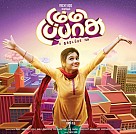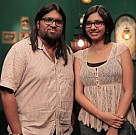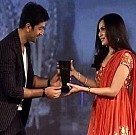''I TRY TO MAKE MY EDITS AS SIMPLE AS POSSIBLE'' - T.S.SURESH
Interview Team : Kaushik L MPHOTOS & STILLS - GALLERY
How did your first film offer happen? And how has the journey been?
I happened to edit some sample scenes and C.S.Amudhan and Y NOT Studios were happy with the output. I jumped on board as the editor of Thamizh Padam. C.S.Amudhan was very clear about what he wanted and he changed my perspective on editing. He wanted me to keep my edit free of gimmicks and needless jerks. Making it simple and neat was the crux.
My journey includes 3 Hindi films and 2 Malayalam films, and of course Santosh Sivan’s Ceylon. It has been great till date.
C.S.Amudhan changed my perspective on editing
What did you learn from editor Anthony?
He would advise me to observe more and to convey the scene in a more crisp and concise manner. He was also very clear on when and where to use gimmicks and effects.
What is the level of your involvement in the scripting stage of a film?
Before shooting begins, there are multiple script narration sessions from the director to me. We discuss about sequences and whether they are needed in a film or not. Nowadays all directors are open to suggestions and there is no personal ego involved as all these discussions are for the film’s benefit.
The recent sequence which really challenged you as an editor
While working for Thagararu, it was challenging to maintain the pace in the climax portions of the film. All the action happens in the rain and it was heavy stuff to handle. Me and the director Ganesh Vinayak took 3 nights to finalize the sequence and I edited the sequence over 12 days.
What’s your philosophy about editing and what’s your style?
My philosophy about editing is that it shouldn’t stand out. It should be natural and hidden. I will try to make it as simple as possible. All elements of a film should be in balance and one aspect shouldn’t dominate the other. In recent times, I quite enjoyed the way films such as Soodhu Kavvum and Kai Po Che were edited.
I always aspire to reach the director’s vision and idea in the best manner possible to the audience. Sometimes it works and sometimes it doesn’t. There are no regrets at all. This is one big learning process, working with so many directors. It is an enriching experience irrespective of success at the box-office.
Once I sign up for a project and commit to it, there is no backing out of it. We editors work on total trust and place our full belief on the director. We can’t create anything new and just have to better the given product. At times, bad films do happen and we must be ready to accept criticism and take things in our stride.
I quite enjoyed the way films such as Soodhu Kavvum and Kai Po Che were edited.
What about the post-release edits which happen in our industry, if initial audience feedback isn’t favorable?
I am not a big advocate of post-release editing. It is not advisable to trim the film and it spoils the entire flow. Psychologically it gives a feeling that something is wrong with the film and this spills over to the audience too. All sorts of editing and trimming needs to be locked before the release of the film. This post-release edit is an Indian psychology and doesn’t happen in Hollywood.
Audiences have become very smart and there is no way that you can cheat them. But we needn’t become too ambitious in our quest to satisfy them. Doing what comes best to us in the best way possible is good enough. Importantly, ample time should be spent on post-production processes as this will reflect on the overall quality of the film.
Audiences have become very smart and there is no way that you can cheat them
About your team of assistants
My assistants are my first critics. They are very helpful and frank. They generally form a basic structure before the edit and I sit on the main edits, most of the times. They grasp things very fast and are very aware of their craft. They watch a lot of films and are more focussed compared to my generation.
But I feel nowadays, it is not even necessary to assist anyone as we can learn on our own from the Internet. One advantage of assisting a senior editor is the networking aspect as we can meet more people.
The editors that you look up to
I actually wished to work with Sreekar Prasad and was waiting for about 6 to 7 months to meet him. He was busy with Hindi films at that time. He has always been an inspiration. I am also amazed by the work of other editors such as Michael Kahn, Thelma Schoonmaker, Lenin and of course Anthony Sir.
Sreekar Prasad, Lenin and Anthony are all unique and proved what all can be done by an adept editor.
The directors that have really shaped your journey as an editor
My first director C.S.Amudhan is motivational and pushes me to come up with something new and out of the box, all the time. He is ready to improvise and is willing to see what the editing tool can do to his final product. I have worked with him in Rendavathu Padam too and am eagerly looking forward to the release of the movie.
I learnt a lot about framing and selecting the best shots and takes from Priyadarshan Sir. I have worked with him on 3 Hindi films, Tezz, Kamaal Dhamaal Malamaal and Rangrezz and also in Malayalam films.
Santosh Sivan Sir gives us a free hand and advises us to try out something based on our instinct. He is open to inputs, suggestions and is welcoming of a different perspective. He opened up my interest to photography and arts. I have started interacting with more people for inspiration, after working with Santosh Sivan. Ceylon was like working in my first film again. We tried to change the grammar of film-making and in Ceylon it was raw, rustic with no ‘beauty shots’.
Kadhalil Sodhappuvadhu Yeppadi’s Balaji Mohan was an editor himself and he knew what he wanted in terms of style and presentation. My job was made simpler in KSY as he knew exactly what he wanted.
Sonna Puriyadhu’s Krishnan Jayaraj is good at communicating and conversing thanks to his ad-film background. He was a co-director in Thamizh Padam and I was acquainted to him even before working on Sonna Puriyadhu.
I would also like to thank Dhayanidhi Alagiri, Sashikanth, Vikram Anand (an aspiring actor), Sushant and all the directors and producers who have given me an opportunity to work on their films.
Ceylon was like working in my first film again
What does the future hold in store? Any big plans beyond editing?
I usually do 5 films or so at a time but have now decided to hold back and become more selective and choosy about the projects that I work on.
Beyond editing, I think I need more maturity and time to decide on whether to take up direction or not. I need some more time to prove myself as an editor. Thamizh Padam was a special launch for me as an editor and I should keep that standard in mind while thinking of launching me in other spheres.
Looking at the trends, I feel that in future, all post production processes will mostly happen under one roof. We need to constantly keep learning and updating our knowledge. There are a lot of advancements and options that keep coming up. We need to keep abreast of these developments to stay in pace.
Behindwoods wishes Suresh a great future and we are looking forward to more impactful edits from this young man in the coming years.
I need some more time to prove myself as an editor
















